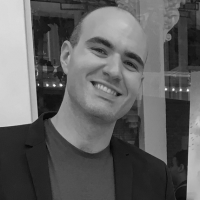Power Rangers: The Road to Queer Representation
We spoke with the people behind the scenes who fought for queer representation in Power Rangers from the ‘90s all the way to today.
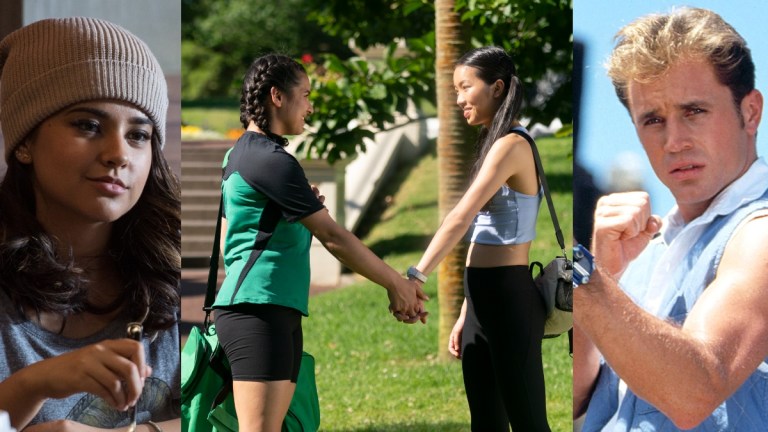
Warning: The article contains references to homophobia and suicide.
On Oct. 15, 2021, Power Rangers Dino Fury’s ‘The Matchmaker’ debuted on Netflix and ended like most Power Rangers episodes do. In it, the Dino Fury team saves the world from a giant monster and Javi, the Black Ranger, learns a valuable life lesson in communication after assuming his sister Izzy, the Green Ranger, had a crush on a guy.
“She really was acting different though,” Javi tries to reason. “I was sure it was cause she had feelings for someone.”
He turns around and spots Izzy smiling with Fern, another teen girl and athlete,
“Feel like ramen?” Fern asks.
“My favorite,” Izzy warmly responds, and holds out her hand to Fern. The two walk off, hand in hand, smiling affectionately at each other. The other Rangers watch them go, delightfully overwhelmed with how cute the two are. Izzy puts her head on Fern’s shoulder. The two girls are dating.
It was a small act of affection, no different than the many other relationships Power Rangers has had in its 28 year run, but it was revolutionary and long overdue. It was Power Rangers’ first out queer character on TV.
Power Rangers, which first aired on Fox Kids in 1993, has long been lauded for its diversity in front of the camera. A vast spectrum of humanity has been reflected in the franchise but queer characters were always missing from that until October 15, 2021. Why?
Power Rangers debuted in the mid ‘90s, at a time when queer characters were not prevalent on TV. Queer characters were slowly making their way into series meant for older audiences but were virtually non-existent on shows meant for children, which of course Power Rangers was and still is.
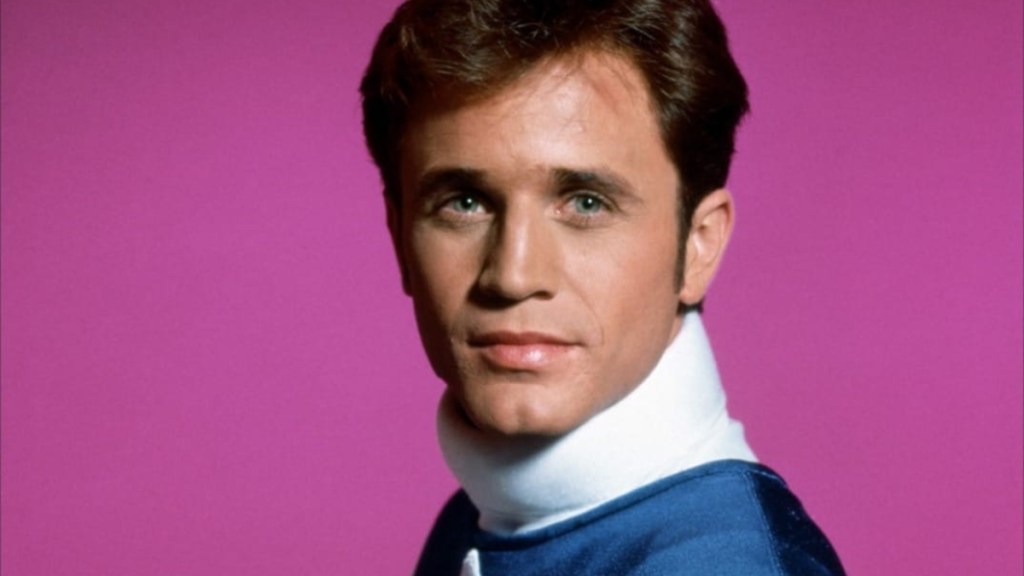
This lack of acceptance on screen was reflected behind the scenes on the series and one person in particular bore the brunt of it. David Yost, who played Billy, the Blue Ranger, knew he was gay while working on the show and had to take precautions to make sure no one would find out. As Yost recalled while speaking to a conference of LGBT Mormons in 2011,
“I said I’m not gonna be gay, I’m gonna focus on my career. I tried to date women, so to speak, but I started to hear rumors about me and my sexuality. For three years the rumors kept getting more and more relentless.”
Yost recalls overhearing producers and co-stars watching footage of him and throwing out homophobic slurs. Yost vividly recalled that several nights he got home from work and contemplated suicide. The emotional toll Yost dealt with exemplifies what it was like for many gay people in Hollywood at the time. “Everybody thinks everybody in Hollywood is accepted and its great to be gay. It’s not if you’re an actor and it’s not if you’re in front of the camera.”
That homophobia came to a head during production of the show’s fourth season, Power Rangers Zeo. At that time Yost’s character had been demoted from being a Ranger to merely the team’s tech support. It was a major step down for the character and Yost feels it was in part because many in the production staff believed that because he was gay he couldn’t be a superhero.
The breaking point occurred when Yost was informed that one of the producers had been questioning the cast and crew about his sexuality. As he discussed in an interview with Power Rangers podcast No Pink Spandex,
“It was a humiliating experience to find that out. I was worried I might take my own life. In order for me to get a handle on what was going on I needed to leave. I walked off set.”
Yost’s character was written out of the series without his involvement. Billy (now played by William Fredrick Knight) suddenly grew older and needed to travel to an alien planet to seek treatment. Billy was never properly seen again.
Former producer Scott Page-Pagter, speaking to TMZ in 2010, claimed that he didn’t know why Yost made these allegations, simply stating “he was the only one no one got along with… he was a pain in the ass.” However, during a panel at Power Morphicon in 2012, Pagter played audio clips from behind the scenes on the show including one that featured a homophobic slur.
The harassment Yost faced sent him into a deeper darkness and he spent many years trying to “get rid of” his sexuality, including many versions of the horrific “Pray the Gay Away.” Thankfully Yost managed to accept his sexuality and now supports The Trevor Project, a suicide prevention and crisis intervention organization for queer youth.
While gay character and relationships, nor a gay actor like Yost, weren’t acceptable on the series, straight characters and relationships were. From the very beginning the show featured straight characters having crushes or going out on dates. One of the biggest of these was the budding relationship between Pink Ranger Kimberly and Green Ranger Tommy, the two sharing a kiss which lead to a long running relationship. At the time this relationship was extremely popular with young fans and the network that aired the series, Fox Kids, had no notes about it, longtime Power Rangers writer Jackie Marchand (she/her) recalls.
After Yost left the series, Power Rangers continued on one season after the other, with straight relationships still a cornerstone of plotlines. However, after the franchise was acquired by Disney from Saban Entertainment in 2001, small steps were made to try and include a queer character.
Marchand, who was an out lesbian at the time, and the other writers knew a gay Ranger was never a possibility at the time but in 2004’s Power Rangers Dino Thunder they introduced Hayley, the team’s resident tech expert. Even though it was never confirmed on screen, Hayley was intended to be a lesbian.
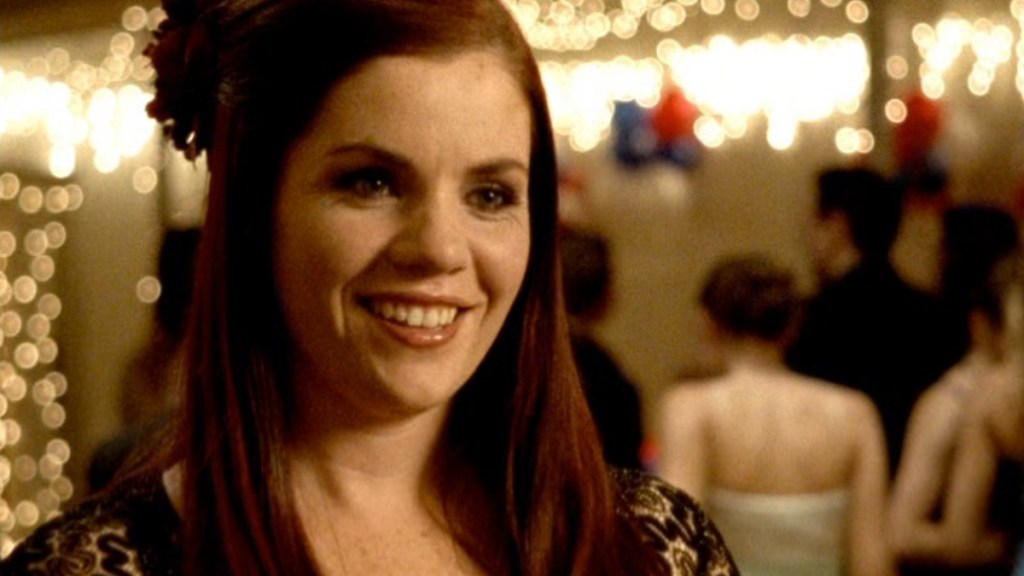
“(Actress Ismay Johnston) was never given any directive or any subtext but (the writers) did talk about it. We were starting to think, could we, in any capacity, introduce a gay character on this show?”
The writers knew they could never mention this to Disney so they slipped it into the script where, as Marchand recalled on the Toku Ladies podcast, “she was going back east to college or something with her old friend. It was very much in subtext.”
In an interview with Den of Geek, Marchand cringes at the memory, comparing it to the infamous Hays Code of early Hollywood that effectively banned direct reference or positive portrayal of gay characters in films outside of deep subtext.
“It’s embarrassing. It’s gross we even had to sneak it under the wire. I believe we did shoot it during the finale but it was cut for time because Hayley wasn’t a major character.”
The memory also provokes great frustration from Marchand who knew that many executives at Disney during that time were gay but, “it just wouldn’t have flown.”
While Hayley’s one scene of deep subtextual confirmation of queer was deleted, the season, like others before it, featured multiple straight relationships or crushes in several episodes.
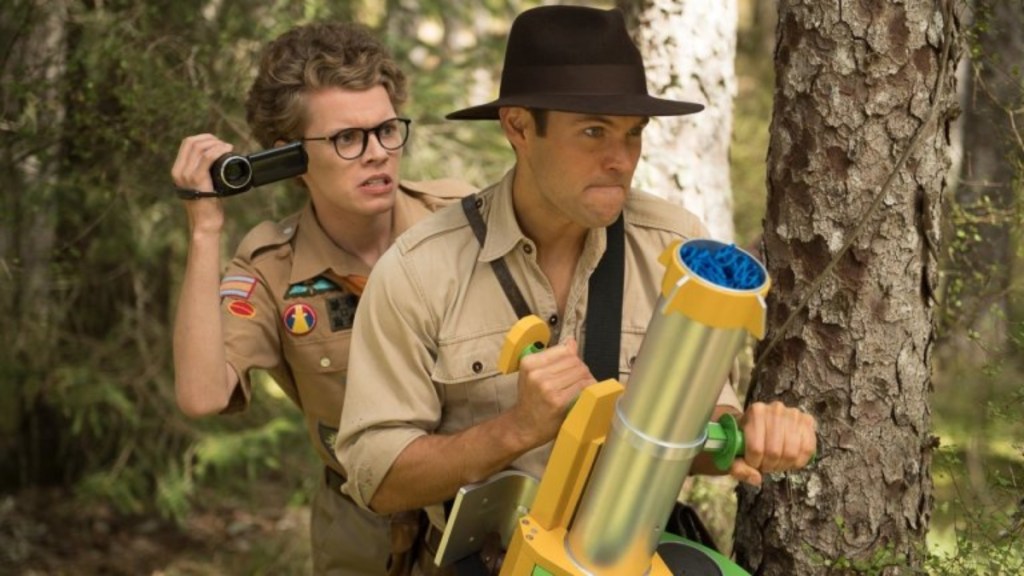
It took another 13 years, and Saban reacquiring the brand, for the franchise to try again and once again it was relegated to subtext. This time though it didn’t come from the writers but an actor, Caleb Bendit (he/him), who portrayed the geeky and neurotic supporting character Monty in 2017’s Power Rangers Ninja Steel. Bendit remembers reading in the initial character description that Monty was obsessed with Victor, an athletic, dim-witted, and fame-chasing supporting character played by Chris Reid.
To the two actors, Monty and Victor seemed like complete opposites. Monty would constantly compliment Victor but those compliments were never returned. Victor would get F’s in school while Monty would pass everything. The only way to make this work, Bendit and Reid decided, was that Monty was in love with Victor. It was a one-sided love which Victor would never return but only because he was so oblivious.
According to Bendit there initially wasn’t any reaction to him playing Monty as gay since it was “obvious” to anyone who’d read the script. “When Monty says, ‘Victor, there’s no one in the world more handsome than you,’ everybody knew.”
The writers even praised Bendit’s take on the character but two months into the shooting Reid and Bendit were caught off guard when they were told by higher ups in production, “we know what you’re doing. They told me not to push my knees so close together. They told me not to touch (Victor). Stop staring into his eyes. I was like, okay, well, when you’re talking to someone, typically you look at them in their eyes, especially if you’re close. So now as an actor you have to think, oh no, am I looking at them in the eyes too much?”
Of course, straight relationships in the seasons were more than acceptable, with two of the Rangers dating throughout the two year run of the show.
Bendit refused to follow any of the new directives and everyone on set treated the new rules like a joke. No one ever enforced it, Bendit theorizing that the directive was given solely as a way for the owners of the franchise, who were based in Los Angeles rather than New Zealand where the show was shot, to assert their control. As Bendit explains this was “very common on other seasons.”
Bendit is key to stress that Monty being gay was only his interpretation for the character, he never would have openly confessed his love for Victor. Giving Monty a crush on Victor was a way to add flavor to the role and to make the character feel more fleshed out to him.
“To me, Monty is sweet and innocent. He’s just so blinded by his love of his friend. The worst thing that could happen to him is he’s not around Victor anymore.”
Director (and now current executive producer) Simon Bennett confirmed to Den of Geek that the gay relationship was never implied in the script.
“The idea was that the relationship was based on an extreme form of hero-worship. Yes, Monty adored Victor. But Victor’s narcissism would never let him see Monty as anything more than a useful servant.”
While all of the directives were trying to be put in place to curtail Bendit’s performance he learned that this wasn’t the first time the topic of a gay character had come up in recent years. He’d been told by people working on the show for years that during development people behind the scenes had wanted and been pushing for a gay character. Additionally, Michael Taber, who played the character of Riley in Power Rangers Dino Charge from 2015-2016, revealed in 2020 that he interpreted and played his part as gay.
What makes this situation all the stranger was that all of this was taking place at the same time that work was being done on the 2017 Power Rangers film, which included a gay character, although one that wasn’t out.
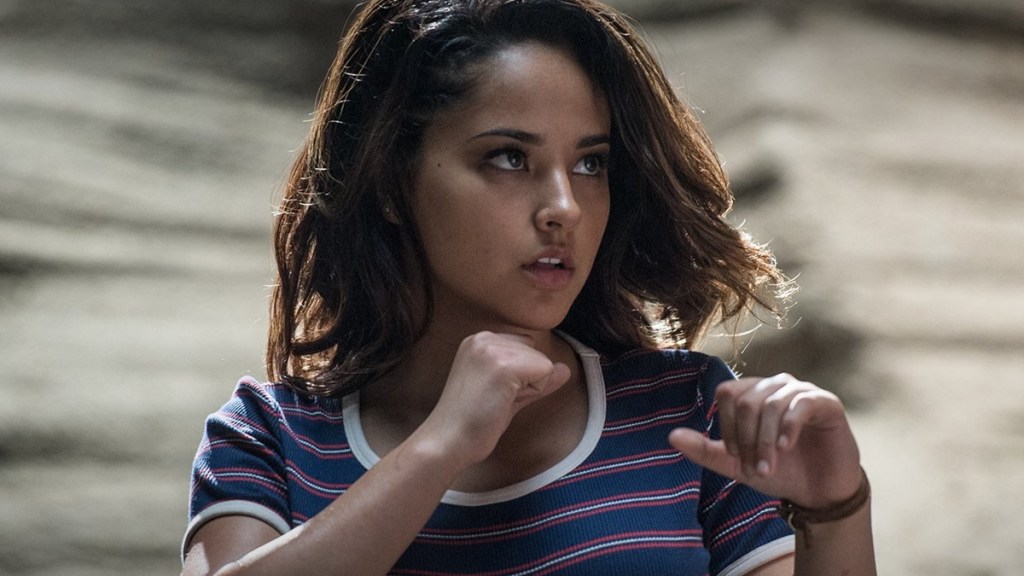
The film, which functioned as a reboot of the first season, had actress Becky G portrayed Yellow Ranger Trini. In a heartfelt campfire scene Trini explains that her parents don’t accept her for who she is or how she dresses. The Rangers ask if she has boyfriend problems and she lets out a dark chuckle,
“Yeah, boyfriend problems.”
They then ask if she’s having girlfriend troubles but Trini doesn’t directly respond. The film never outright states how she identifies but it’s clear she’s not straight. At the time of the film’s release director Dean Israelite confirmed to us that Trini, “has a lot of questions about her identity and I think she hasn’t figured them all out yet.”
Becky G took this aspect of the character seriously, telling US Magazine that she felt a sense of responsibility to not only play a character struggling with their identity but one that also represented her Latin community.
“To be a female Latina superhero representing somebody who was questioning her sexuality, I was honored to play that character.”
At the time of the film’s release, many viewers questioned why Trini didn’t label herself in the film or why Trini wasn’t more comfortable with her identity. After years of so little representation it can be frustrating to a queer audience when the majority of the stories they get are about characters struggling instead of thriving.
For Becky G she believed that what Trini was experiencing, “isn’t something that you just wake up and know. And even if you did, it’s not something that’s easy to talk about especially at her age given the area she grew up in and also the cultural circumstances that she grew up in.”
Israelite stated to us that Trini not wanting to label herself was “very modern and very relatable.” However, as Becky G pointed out to US Magazine, “For individuals who read (about Trini’s sexuality) they knew. And for people who didn’t, it went right over their heads.”
Becky G and Israelite both count this as a positive and as laudable as Trini’s subtle struggle was, it was only a very small part of the movie. Part of this could be explained away by the fact that multiple sequels were planned, turning what was one small moment into the beginning of a bigger character arc, but with sequels to the film not looking likely, the one scene feels lacking.
You’d think that this would have been a watershed moment for queer representation in the Power Rangers franchise, that with producers comfortable enough to have Trini questioning her sexuality in the film that queer characters would start making their way into other parts of the franchise, at least ones geared more to adult fans.
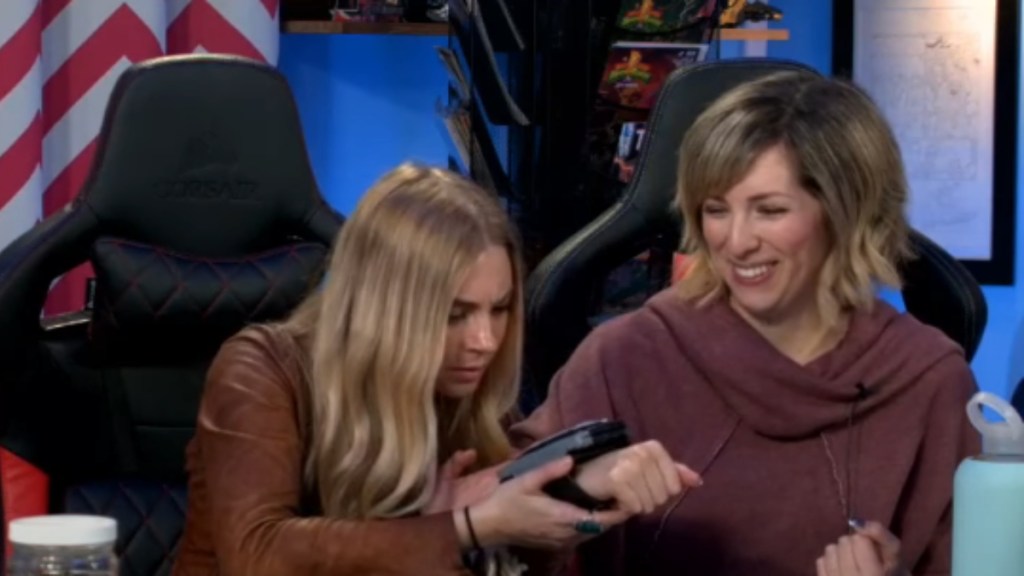
There were attempts. In the same year the movie was released, an interactive live-streamed tabletop role-playing game, courtesy of Saban and Hyper RPG, debuted entitled Power Rangers Hyperforce. Meghan Camarena (she/her), who played Pink Ranger Chloe, found Trini in the film to be “super affirming and validating” especially since Camarena is pansexual and half Hispanic. However, when Camarena wanted to make her character bisexual she was told by Saban that while it was okay for her to play her character as bisexual, it was never going to be explored. She could imply it but it could never be stated. This was made all the more difficult at the time because Camarena wasn’t out publicly.
Coming out was daunting for her, especially since she’s also a social media influencer with popular Twitch and YouTube channels.
“It was a scary journey,” she recalls to Den of Geek. “When you’re an influencer, how much of your personal life remains private? How much do you share to help inspire and encourage others? I also have a lot of sponsors that are fairly conservative and you never know who you’re going to upset.”
Camarena was afraid that all the work she’d done over the past 15 years would be lost if she came out. However, despite not being able to reveal the character’s sexuality, playing Chloe helped Camarena become comfortable with her sexuality .
“I owe a lot of my coming out to my character.”
Even with the restrictions Camarena stood firm in trying to play the queer part of the character as much as she could. She remembers an episode where the Rangers traveled back in time and met Guinevere in the time of King Arthur and reveals that Chloe was attracted to her.
“The actress who played her was such a babe. I was vibing with that whole storyline and I wanted to lean into (the attraction) so bad.”
Once again, straight relationships were perfectly acceptable and the season even featured a straight wedding.
Camarena laments that for Saban it was “never a convenient time” to add more queer characters to the franchise. Recently though, Camarena co-created an original live-streamed tabletop role-playing game, The Unleashed. After Hyperforce Camarena was determined to make a superhero series that featured a diverse queer cast.
“Anything that I make, I want those gay storylines. I don’t want it to be like ‘the gay character.’ I want it to be a world where these characters are gay and this is their life.”
Comics was another area in which Power Rangers could have added in gay characters. In 2016 Boom Studios acquired the rights to publish a Power Rangers comic, one that was geared toward the adult fans. The comic was set within the continuity of the TV series which, according to senior editor Dafna Pleban (she/her), meant they couldn’t make broad changes to the characters’ relationships or how they identified. Power Rangers is a major brand and that comes with constraints on what you can and can’t do.
The comic did include romances, bringing the Kimberly and Tommy relationship to the forefront, and even added new hints of romance between other straight characters. In 2018, after the comic had experienced enormous success, Pleban, herself bisexual, found an opportunity to create a new Ranger, one that wouldn’t have the same constraints as characters from the TV show. Pleban brought in noted comic book writer Marguerite Bennett (she/her) (no relation to Simon Bennett), who worked on comics such as DC’s Bombshells and Batwoman, to helm the third year of the comic. Bennett, who identifies as queer, has long fought for queer characters in her work and had experienced pushback in the past.
“I was trying to sneak gay this and queer that into everything,” she remembers, “(I would) get caught and be told, okay, well, it’s not the right time. It has to be done in a certain way. (We’re) worried about the optics. We just don’t feel that it’s compatible. There needs to be a story reason. All of the exhausting excuses.”
A self proclaimed, “plague dog of queerness,” Bennett didn’t hold back when she laid out her ideas which featured a team of Rangers lost in another universe meeting a Ranger who was queer. Saban had some notes.
As Bennett describes it, Saban was concerned that they wanted the TV show to break the ground of having a queer character before the comics would. The show was considered more important than the comic and they didn’t want the comic to upstage it for such a momentous occasion. They wanted to wait for the right moment in their flagship medium to introduce a queer character.
Bennett says she “pushed politely” back against Saban and they went back and forth about it. She speculates that Saban getting ready to sell the franchise to toy giant Hasbro might have contributed a “too many cooks in the kitchen” atmosphere to the proceedings.
This is a strange reaction from Saban considering the 2017 movie had been out for over a year at that point. You can’t get more flagship than a big budget movie. Bennett says that Saban considered that to be somewhat different than what she was planning.
“It was brought up (in the movie) but it was raised as a question. It wasn’t necessarily confirmed. (I wanted to write) a character who’s just, you know, going to be smooching her girlfriend on the page.”
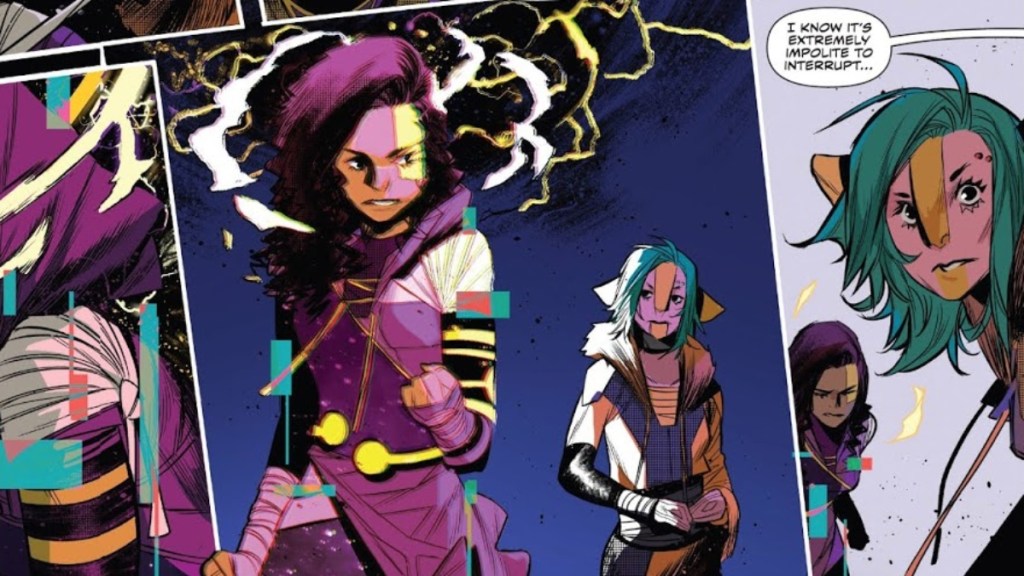
In the end Marguerite was given the go ahead and created Ellarien (or Ari for short), the Solar Ranger, a lone wolf who carries the enormous weight of the powerful Solarix. The only person she trusts is Remi, who’d previously saved Ari and took care of her.
“Ari could be vulnerable around Remi. Encapsulated within that vulnerability was that level of intimacy, that she should fall in love with that person.”
The two’s relationship was hinted at and Bennett wanted to end the storyline with “a big smooch” but instead it ended with Ari and Remi, now a Ranger herself, holding hands. It wasn’t what Bennett wanted but, “it at least served the emotional intention that these two people are connected on a much deeper level.”
(It should be no surprise at this point that the arc featured yet another straight relationship.)
While many fans picked up the intention of the hand holding it was yet another example of queer characters not being allowed to be out and proud in Power Rangers. That changed in 2020 when a hardcover collection of Beyond the Grid was released that featured a new story by Bennett, one that made the characters’ relationship very clear. The two share a kiss as Ari thinks about how much she loves Remi, saying,
“Remi was more worthy than she could have imagined. Now we don’t have to imagine. And we don’t have to believe our eyes. We believe our hearts.”
It was a triumphant moment and Bennett’s joy at getting to write it is clear on the page. She credits the fans as being the ones to help make it happen, their enthusiasm and passion proving that they wanted more of the characters. She also believes that since there wasn’t any backlash from the two appearances in the original arc that allowed her to take the characters further.
It should be noted that while the original Beyond the Grid arc was overseen by Saban Brands, Hasbro owned the brand when the new story was published in 2020.
Ari and Remi have gone on to appear in other Power Rangers comics and Pleban is proud that they’ve been clearly portrayed as a couple in those stories and they get to live happy lives as Rangers. She also intends for more stories to be told about them. To her, it was inevitable they’d be queer from the start.
“When your editor’s queer and your writer’s queer and (artist) Simone Di Meo draws cute girls, I don’t know what you expected was going to happen. The clowns are driving the bus. Where do you think the bus was gonna go?”
The confirmation of Ari and Remi’s relationship was a triumphant one for fans, only mildly soured by the notion that it could only happen in an expensive hardcover collection. Thankfully, that relationship was just the start of Power Rangers finally embracing queer characters after so long.
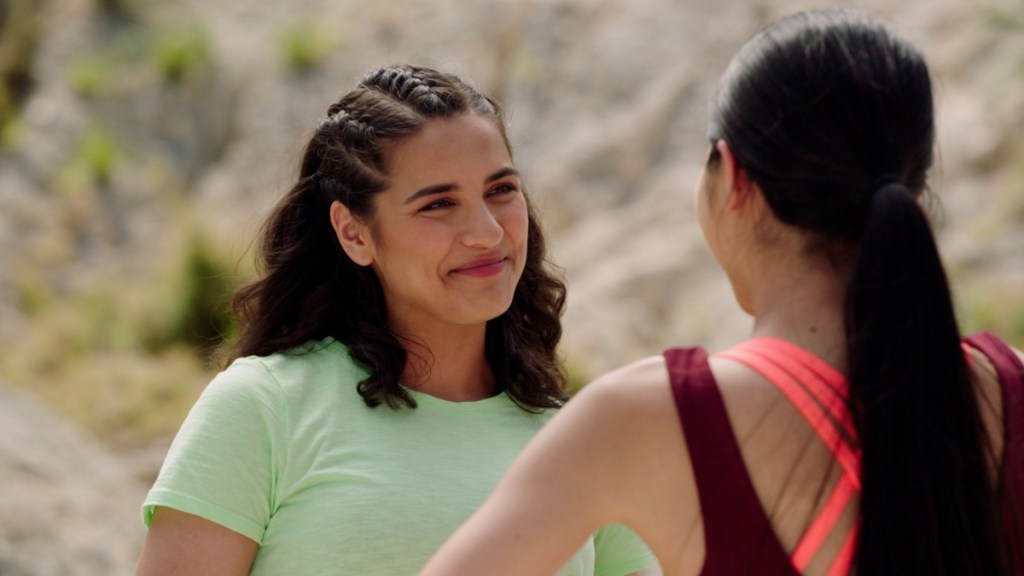
In 2021 Power Rangers Dino Fury debuted on Nickelodeon and, after nearly 30 years with endless straight relationships, the character of Izzy Garcia made her triumphant debut as the first out queer Ranger in the TV show’s history along with her girlfriend, Fern. The two are absolutely adorable together and there’s nothing subtle about their relationship. Izzy gives Fern kisses on the cheek, the two go to prom together, and Izzy directly refers to Fern as her girlfriend. It was a giant leap forward for the franchise after endless years of subtext, missed opportunities, and outright homophobia.
But Izzy being queer wasn’t always a sure thing.
“Making Izzy a member of the LGBTQ+ community, was the writers’ intention from the beginning of her character development,” explains Dino Fury Executive producer Simon Bennett.
However, Izzy actress Tessa Rao stated in an interview with ComicBook.com that when she was cast for the role it hadn’t been set in stone yet.
Bennett does reveal that when episode 5 of the season was being written, where Fern was first introduced, he and the writers weren’t sure if they’d be able to follow through with their vision for Izzy and Fern. Bennett didn’t elaborate on the process of getting the approval for Izzy being queer, simply stating, “as always with the production process, there were a lot of conversations across different teams.” Bennett also clarified that Izzy being approved as queer had nothing to do with the show moving from Nickelodeon to a Netflix exclusive series.
When word came down that the episode confirming Izzy and Fern as a couple was approved, Bennett and the writers had a rainbow cake to celebrate.
With feedback from GLAAD (Gay & Lesbian Alliance Against Defamation), the writers carefully crafted Izzy’s story to, as Bennett describes, “portray a piece of what kids may see in their everyday life.” A conscious part of this was making it clear the two were together with Fern telling another character that she “doesn’t date boys,” the kiss on the cheek, and Izzy using the word “girlfriend.”
This decision was supported by GLAAD and part of the writers’ effort to make the relationship between the two, “realistic and ongoing, though not necessarily too perfect,” Bennett says. The most important thing to the team was to normalize the relationship for audiences and portray it the same way they would any other relationship. In a delightful turn of events, Izzy and Fern are the only confirmed relationship so far in the series.
When the episodes aired, some fans questioned how Izzy and Fern identified. While they were dating we didn’t know if they were lesbians, bisexual, or something else. Bennett says that like Fern, Izzy would also say that she doesn’t date boys if asked.
“The main thing is that we didn’t want to get tangled up with labels in a show that is made for young children. We wanted to portray a loving, realistic relationship in a way that is suitable for the show’s target audience.”
This particular moment stood out to Marguerite Bennett, who knows that younger kids and teens discovering their sexuality feel a lot of pressure to pick a label for themselves. She gets why it’s so important to have labels when it comes to media, what with so many characters sexuality often left ambiguous, however,
“I thought I was bisexual for a long time and now I’m really quite confident that I’m a lesbian. Things change over the course of the human experience. The fact that it wasn’t (Fern) saying I’m bisexual or I’m a lesbian, she just said I only date girls. That got the same point across without requiring you to have your identity definitively hammered home.”
Dr. Shanéa Thomas (he/she/Dr.) is a Black queer nonbinary Senior Lecturer at the Suzanne Dworak-Peck School of Social Work, and a licensed clinical social worker, spoke to us about how powerful the portrayals of Izzy and Fern are, especially as they’re both people of color. Dr. Thomas describes that media for queer people of color has been a “struggle” and that shows with those characters don’t tend to last very long. Dr. Thomas sees Izzy and Fern as a source of consistency for viewers, a couple they can see for more than just a single arc of episodes. It was also heartwarming for him to see queer people of color in a relationship that was “innocent and childlike.”
Dr. Thomas describes that many queer relationships on TV often jump right into physical intimacy and she loved how Izzy got to have moments like getting her hair done to impress Fern.
“We associate queerness with, it’s instantly sex. You’re a teenager and you can’t control your body parts. And that’s fine, but queer kids also need a way to learn how to interact with each other. If I were to watch these episodes (as a younger person) it would probably help me understand how to talk to other people I was attracted to. Having this kind of courting and flirting, this unsureness around whether someone likes you or not, that just doesn’t really exist. I feel like (Dino Fury) did a perfect job of, like, this is what puppy love looks like for queer folks.”
Simon Bennett has nothing but pride for what the team behind the scenes was able to accomplish with Izzy and Fern and is thrilled with the overwhelming support they’ve received from fans and the wider audience. The show was even nominated for a GLAAD award.
“Izzy’s storyline is a huge step in LGBTQ+ representation for Power Rangers, and we hope more and more fans in the glorious diversity that is the human condition, can feel themselves being represented on the show.
With Izzy and Fern now the shows first out and confirmed queer characters, what’s next for Power Rangers? Could we see male queer characters, something that’s often viewed as even more taboo in children’s entertainment? Bennett believes that portraying Izzy as a queer character would be a breakthrough for Power Rangers and that will, “hopefully open the door for different opportunities in the future.”
When asked what she hopes will be next for queer characters in Power Rangers, Marguerite Bennett says, “my absolutely childish, greedy answer is more. Queer writers, producers, actors, we’re here in the world.”
She also makes sure to give praise not just to herself and those making queer characters in Power Rangers today but to all the people who came before her.
“The people working on Power Rangers for years and years, actors, directors, writers, producers, and behind the scenes people, there were so many queer people who don’t get the attention and appreciation for what they did in shepherding and cultivating the story. I’m just hoping the forthcoming generations don’t have to deal with that shit.”
Jackie Marchand applauds Dino Fury for what it’s done and has nothing but praise for how Izzy was handled. She never believed in her lifetime that queer representation would be where it is now and it’s especially amazing for Power Rangers.
“From my first day on the show where there was a gay man who couldn’t even be out and who got a very hard time about being gay? Now we’re at a point where you can have a gay character on screen. It’s a beautiful progression that makes me very happy. I’m happy for the queer kids who are able to see this and also for the longtime queer fans who’ve been waiting and waiting for this day. It’s a happy day.”
